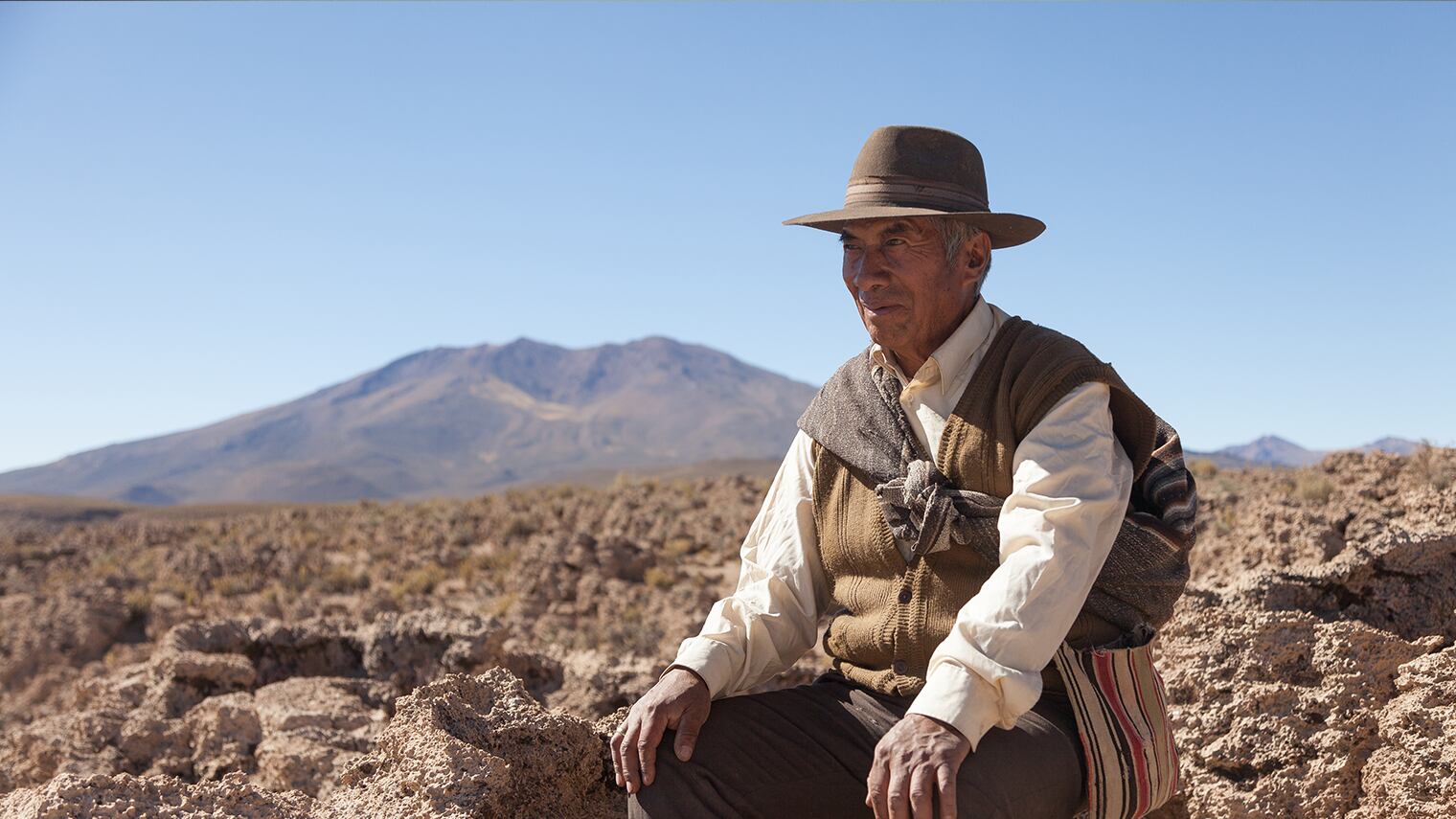UTAMA
*** Facing a drought so severe that Quechua villages in the Bolivian high desert are basically abandoned, one of llama herder Virginio’s few remaining neighbors has a tragically beautiful explanation: “Time has gotten tired.” Depicting the struggle of isolated elderly couple Virginio and Sisa to continue their agrarian routines, debuting director Alejandro Loayza Grisi tells us indirectly but impactfully that they can’t go on like this for much longer. You can hear it in Utama’s most resonant sound: Virginio’s labored breathing, which soundtracks every scene he’s in (despite his visiting grandson’s many protests, the old man doesn’t fear death, only death in a hospital). Though thematically weighty, the story is almost wishfully simple in execution. It’s proud and hushed, performed with rough-hewn starkness by nonprofessional actors José Calina (Virginio) and Luisa Quispe (Sisa) and sparing the audience the pricklier underbelly of character complications. On its own terms, though, Utama (Quechua for “Our Home”) is a striking portrait of Indigenous populations surviving on the front lines of climate change—and Virginio’s llamas (whose ears are tagged with hot-pink fabric) loping across the foreground of desert landscapes make for as incredible a visual effect as they do a symbol. Sometimes the flock speaks louder than the shepherd: There is life here. NR. CHANCE SOLEM-PFEIFER. Living Room.
BAD AXE
*** The ceaseless turmoil of 2020 touched every American in some way, but the Siev family of Bad Axe, Mich., had more than their share of skin in the game. This documentary by David Siev begins as a portrait of his family trying to keep their restaurant afloat during the first wave of COVID-19—but in the rural battleground of Lower Peninsula Michigan, tension escalates in the summer of George Floyd’s murder, mask mandates, and hate crimes against Asian Americans. Amid these conflicts, patriarch Chun becomes his son’s most interesting subject. A survivor of the Cambodian genocide, Chun maintains a fascinating balance between keeping his head down and his hands ready should the shit hit the fan. Though David deeply understands his family’s dynamics, some attempts at production value (like overwrought music cues and sign-posting the Sievs’ journey too generically via events like election night 2020) diverge from Bad Axe’s best quality: the specificity of one family trying to do the impossible in a grounded way in a precise town at a precise moment. You couldn’t blame any 2022 viewer for being wary of reliving 2020 this soon, but doing so through the Sievs’ eyes is an enlightening and affecting experience. NR. CHANCE SOLEM-PFEIFER. On demand.
BONES AND ALL
*** Moviegoers expect certain motifs from a coming-of-age road trip film—stunning visuals, complex character development, growing pains in uncertain environments—all of which Luca Guadagnino’s Bones and All supplies in heaping amounts. However, the whole human-eating business really came out of left field. Star Taylor Russell (Waves) cultivates a sincere sense of realism as Maren, a teenage girl with an inexplicable and uncontrollable craving for human flesh—while a typecast Timothée Chalamet perfectly portrays Lee, a brooding rebel with the suave demeanor of James Dean (and the same cannibalistic affliction as Maren). In search of a cure for her condition, Maren and Lee set off on a cross-country drive to find Maren’s mother. Unsurprisingly, they begin to fall in love, making Bones and All a horror movie in the same way a tomato is a fruit. Sure, there are generously gory shots and adrenaline-spiking chase sequences, but it just doesn’t feel like a horror film. There’s a novelty to hybridizing two genres with such distinctly opposite motifs (orchestrated with an undeniable attention to detail by Guadagnino), but the end result remains a tomato. Not exactly horror, not exactly romance, but something in between for people to argue over. R. ALEX BARR. Opens Tuesday, Nov. 22, at Bridgeport, Cascade, Cinema 21, Cinema 99, City Center, Clackamas, Division, Eastport, Evergreen Parkway, Fox Tower, Lloyd Center, Movies on TV, Progress Ridge, Tigard, Vancouver Mall, Vancouver Plaza.
BLACK PANTHER: WAKANDA FOREVER
** Some burdens are too weighty for a sovereign ruler to bear—even Marvel, the king of movie franchises. When Black Panther star Chadwick Boseman died of cancer in 2020, he left behind a legacy of regal roles, from Jackie Robinson in 42 to the mythic “Stormin’ Norman” in Spike Lee’s Da 5 Bloods. Yet no character has defined him more than King T’Challa, leader and defender of the Afrofuturist utopia Wakanda. Recasting was ruled out, so the series has been reengineered to focus on T’Challa’s sister, Shuri (Letitia Wright). When Wakanda Forever begins, Shuri has barely begun to confront her grief when she is challenged by Namor (Tenoch Huerta Mejía), the quasi-authoritarian ruler of an underwater kingdom. Compromises and threats give way to violence—and, because this is Marvel, weightless and incoherent visual effects (but no rampaging rhinos this time around!). The spectacle was subpar in the first Black Panther, but that film was borne aloft by the formidable charisma Boseman and Michael B. Jordan, who played T’Challa’s vulnerable and ruthless rival for the throne. With a sleeker script (Wakanda Forever runs 161 minutes), Wright and Huerta Mejía might have owned the sequel the way Boseman and Jordan owned the original, but their performances get lost in a rush of bland battles and baffling detours (believe it or not, both Lake Bell and Anderson Cooper are stuffed into the story). If Wakanda does endure forever, it will be because of the legacy Boseman and the first film left behind, not the ungainly mythmaking Marvel has attempted in its wake. PG-13. BENNETT CAMPBELL FERGUSON. Academy, Bagdad, Cedar Hills, City Center, Eastport, Fox Tower, Laurelhurst, Living Room, Lloyd Center, Pioneer Place, St. Johns, St. Johns Twin, Studio One, Tigard, Wunderland Milwaukie.

